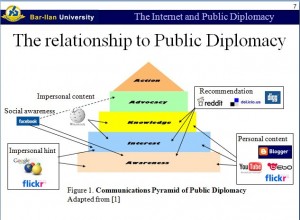 With the advent of Web 2.0 technology (including blogs and social networking), the Internet is increasingly becoming a political medium for expressing views and influencing public opinion, both domestically and internationally.
With the advent of Web 2.0 technology (including blogs and social networking), the Internet is increasingly becoming a political medium for expressing views and influencing public opinion, both domestically and internationally.
The lecture examines the emerging phenomenon, current practice and likely future directions.
Recent changes include:
- Last month the US state department made the move to Web 2.0 with a blog “dipnote” at blogs.state.gov
- This month the BBC started making some content available on Bebo, in March some BBC content went on YouTube.
- In August the BBC added Social Networking links to their news stories. Their explanation page on this refers you to a Wikipedia page for more information
- The split between official websites and unofficial blogs and Web 2.0 is blurring rapidly. Official sites are starting to reply on Web 2.0 community sites for leverage
A glance at the companies:
Google: 124.9 mill. unique visitors last month, most popular site on the internet
YouTube: 49.5 million unique visitors last month, 2 Years old, sold to Google for $1.65 Billion in stock last year
Facebook: 54 million users, 24.2 million unique visitors last month, 5th most popular site on the internet. 3 years old. Last month a small fraction (1.6%) sold to Microsoft for $240 Million, (so total value was calculated as $15 Billion)
Web 2.0 and Iraq
- US see the use of You Tube as an intentional force multiplier by Al Qaeda. You Tube and Google Video have responded with censorship.
- Videos have been removed that “display graphic depictions of violence in addition to any war footage displayed with intent to shock or disgust, or graphic war footage with implied death” – Julie Supan, senior director of marketing, YouTube
- “I felt it was information the U.K. news was unwilling to tell” – UK poster of video
- “anti-war feelings and Muslim beliefs (the religion of peace) motivates me” – Turkish poster (age 19)
US training for Palestinian online activists
This month the U.S. Consulate General invited an experienced activist from the U.S. to work with local Palestinian advocacy groups on communicating their message through the media:
- “They were eager to test-run some of his strategic new media tools for advocacy, public information and outreach.”
- “Ideas included text message campaigns aimed at teenagers, social networking through the Web site Facebook”
Emerging Threats
- Big lie theory and the rewriting of history
- Mass movements that lend legitimacy and use peer pressure as an effective tool
- People convince themselves, hard to then change their mind
- No longer reporting the news but asking people to help make / manufacture the news
- Direct democracy with partisan opinion leaders and no concept of neutral comment
- Volume is truth, truth is decided democratically
